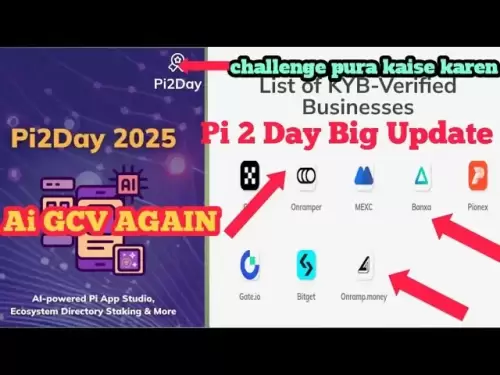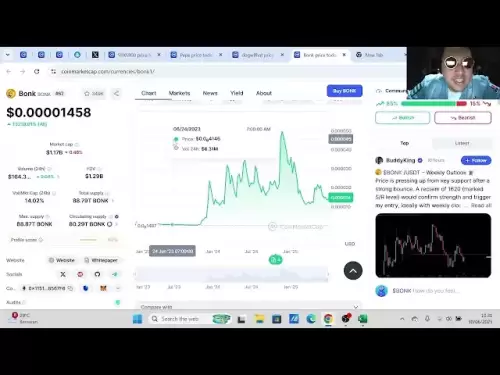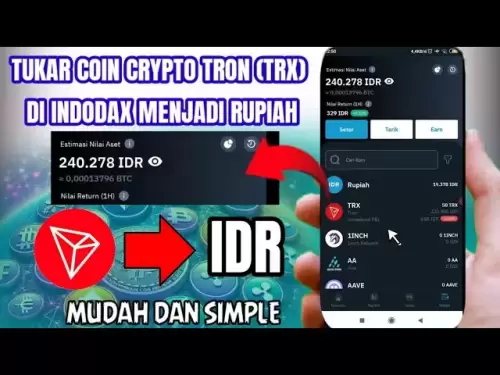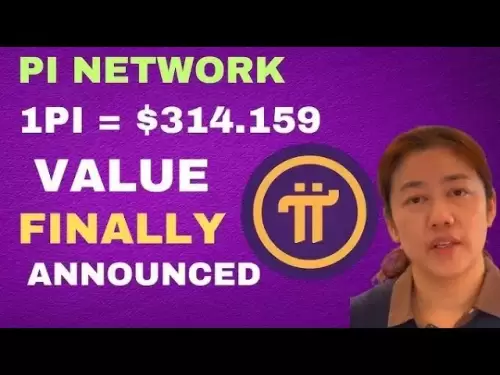-
 Bitcoin
Bitcoin $108,489.6704
1.13% -
 Ethereum
Ethereum $2,502.0528
2.92% -
 Tether USDt
Tether USDt $1.0002
0.00% -
 XRP
XRP $2.1941
0.51% -
 BNB
BNB $655.3375
1.00% -
 Solana
Solana $151.5977
1.27% -
 USDC
USDC $0.9999
0.00% -
 TRON
TRON $0.2768
0.32% -
 Dogecoin
Dogecoin $0.1676
2.86% -
 Cardano
Cardano $0.5675
0.98% -
 Hyperliquid
Hyperliquid $40.6109
7.48% -
 Bitcoin Cash
Bitcoin Cash $500.7746
2.09% -
 Sui
Sui $2.8328
2.03% -
 Chainlink
Chainlink $13.4452
1.26% -
 UNUS SED LEO
UNUS SED LEO $9.1623
0.39% -
 Avalanche
Avalanche $18.2267
2.24% -
 Stellar
Stellar $0.2382
0.00% -
 Toncoin
Toncoin $2.8885
1.68% -
 Shiba Inu
Shiba Inu $0.0...01159
0.91% -
 Litecoin
Litecoin $87.1827
0.88% -
 Hedera
Hedera $0.1511
2.90% -
 Monero
Monero $315.4992
-0.59% -
 Polkadot
Polkadot $3.4663
2.34% -
 Bitget Token
Bitget Token $4.6118
-0.65% -
 Dai
Dai $1.0000
-0.01% -
 Ethena USDe
Ethena USDe $1.0003
0.02% -
 Uniswap
Uniswap $7.2989
4.69% -
 Pepe
Pepe $0.0...01003
5.73% -
 Aave
Aave $275.5616
7.15% -
 Pi
Pi $0.5181
-2.49%
How transparent is the Solend (SLND) coin development team?
Solend's transparent development process, exemplified by open-source code, regular updates, community engagement, and third-party audits, fosters trust and ensures the integrity of its platform.
Jan 09, 2025 at 07:12 am
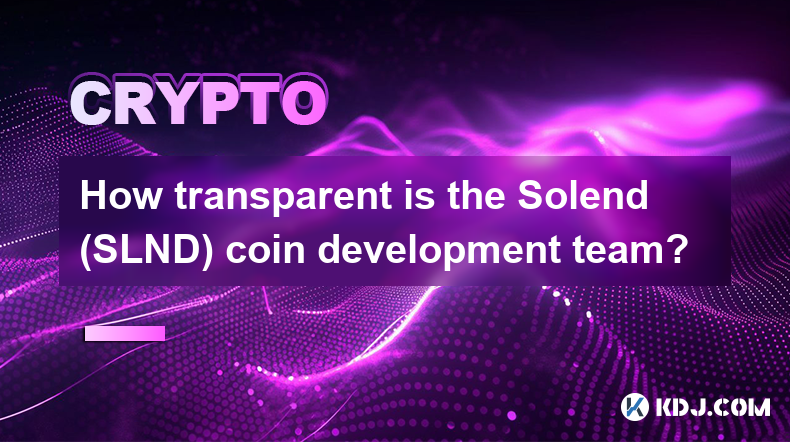
Key Points:
- Solend's development team is considered transparent due to its open-source code, regular updates, and community engagement.
- The team utilizes public platforms like GitHub and Discord to foster a collaborative environment and provide project insights.
- Solend's code undergoes regular audits by reputable firms, ensuring its security and integrity.
- The team maintains a strong and responsive presence on social media, openly communicating with the community.
Transparency in Solend's Development
- Open-Source Code: Solend's code is fully open-sourced on GitHub, allowing anyone to review and contribute to the project's development. This fosters transparency and encourages community involvement.
- Regular Updates: Solend's team releases frequent updates and commits to the project's GitHub repository. These updates provide detailed information about new features, bug fixes, and performance enhancements, keeping the community informed about project progress.
- Community Engagement: Solend maintains a dedicated Discord server where the development team interacts with community members. Users can ask questions, provide feedback, and participate in discussions, fostering a sense of openness and collaboration.
- Third-Party Audits: Solend's codebase has undergone multiple audits by reputable firms such as Kudelski Security and CertiK. These audits assess the code's security, ensuring its integrity and adherence to best practices.
- Social Media Presence: Solend's team maintains a strong presence on social media platforms like Twitter and Telegram. They actively engage with the community, provide project updates, and respond to questions, demonstrating openness and responsiveness.
Top Open-Source Cryptocurrency Development Teams
(Excluding FTX)
1. Ethereum (ETH)
- Led by Vitalik Buterin and a global team of contributors
- Fully open-sourced and decentralized
- Community-driven development with ongoing improvements
2. Bitcoin Core (BTC)
- Maintained by a decentralized group of developers
- Open-source code available for public review
- Transparent contribution process through pull requests
3. Polkadot (DOT)
- Founded by Gavin Wood, co-founder of Ethereum
- Scalable, open-source blockchain with a unique consensus mechanism
- Active developer community and regular code updates
4. Cosmos (ATOM)
- A network of interconnected blockchains
- Modular and open-source architecture
- Community-driven development with a strong ecosystem
5. Tezos (XTZ)
- A self-amending blockchain with a focus on formal verification
- Open-source code and a structured governance model
- Proof-of-Stake consensus mechanism
FAQs:
Q: Why is transparency important in a cryptocurrency development team?
A: Transparency fosters trust between the team and the community, ensures code integrity, allows for public scrutiny, and promotes active participation.
Q: What are the benefits of an open-source codebase?
A: Open-source code allows for community collaboration, increased security through peer review, and greater flexibility for customization.
Q: How do third-party audits enhance a project's credibility?
A: Audits by reputable firms provide independent validation of the codebase, assuring users of its security and compliance with best practices.
Q: What is the role of community engagement in transparent development?
A: Community engagement allows for open dialogue, feedback from users, and contributions from developers, fostering collaboration and a sense of shared ownership.
Disclaimer:info@kdj.com
The information provided is not trading advice. kdj.com does not assume any responsibility for any investments made based on the information provided in this article. Cryptocurrencies are highly volatile and it is highly recommended that you invest with caution after thorough research!
If you believe that the content used on this website infringes your copyright, please contact us immediately (info@kdj.com) and we will delete it promptly.
- Rekt, Ovie Faruq, and the Movement: How a Crypto Meme Became a Consumer Brand
- 2025-06-30 21:10:14
- BlockDAG, Crypto Loyalty, and the XRP Slide: What's the Buzz?
- 2025-06-30 21:10:14
- Cryptos to Invest in Now: Spotting the Future Giants
- 2025-06-30 20:50:12
- PENGU's Upside Rally: Decoding the Stock Potential
- 2025-06-30 21:15:12
- Arbitrum, Robinhood, and Pullback Risk: Decoding the Latest Buzz
- 2025-06-30 21:20:12
- Chainlink Price Prediction: Will LINK Hit $13 Peak or Face Correction?
- 2025-06-30 21:25:11
Related knowledge

How to customize USDT TRC20 mining fees? Flexible adjustment tutorial
Jun 13,2025 at 01:42am
Understanding USDT TRC20 Mining FeesMining fees on the TRON (TRC20) network are essential for processing transactions. Unlike Bitcoin or Ethereum, where miners directly validate transactions, TRON uses a delegated proof-of-stake (DPoS) mechanism. However, users still need to pay bandwidth and energy fees, which are collectively referred to as 'mining fe...

USDT TRC20 transaction is stuck? Solution summary
Jun 14,2025 at 11:15pm
Understanding USDT TRC20 TransactionsWhen users mention that a USDT TRC20 transaction is stuck, they typically refer to a situation where the transfer of Tether (USDT) on the TRON blockchain has not been confirmed for an extended period. This issue may arise due to various reasons such as network congestion, insufficient transaction fees, or wallet-rela...

How to cancel USDT TRC20 unconfirmed transactions? Operation guide
Jun 13,2025 at 11:01pm
Understanding USDT TRC20 Unconfirmed TransactionsWhen dealing with USDT TRC20 transactions, it’s crucial to understand what an unconfirmed transaction means. An unconfirmed transaction is one that has been broadcasted to the blockchain network but hasn’t yet been included in a block. This typically occurs due to low transaction fees or network congestio...

How to check USDT TRC20 balance? Introduction to multiple query methods
Jun 21,2025 at 02:42am
Understanding USDT TRC20 and Its ImportanceUSDT (Tether) is one of the most widely used stablecoins in the cryptocurrency market. It exists on multiple blockchain networks, including TRC20, which operates on the Tron (TRX) network. Checking your USDT TRC20 balance accurately is crucial for users who hold or transact with this asset. Whether you're sendi...

What to do if USDT TRC20 transfers are congested? Speed up trading skills
Jun 13,2025 at 09:56am
Understanding USDT TRC20 Transfer CongestionWhen transferring USDT TRC20, users may occasionally experience delays or congestion. This typically occurs due to network overload on the TRON blockchain, which hosts the TRC20 version of Tether. Unlike the ERC20 variant (which runs on Ethereum), TRC20 transactions are generally faster and cheaper, but during...

The relationship between USDT TRC20 and TRON chain: technical background analysis
Jun 12,2025 at 01:28pm
What is USDT TRC20?USDT TRC20 refers to the Tether (USDT) token issued on the TRON blockchain using the TRC-20 standard. Unlike the more commonly known ERC-20 version of USDT (which runs on Ethereum), the TRC-20 variant leverages the TRON network's infrastructure for faster and cheaper transactions. The emergence of this version came as part of Tether’s...

How to customize USDT TRC20 mining fees? Flexible adjustment tutorial
Jun 13,2025 at 01:42am
Understanding USDT TRC20 Mining FeesMining fees on the TRON (TRC20) network are essential for processing transactions. Unlike Bitcoin or Ethereum, where miners directly validate transactions, TRON uses a delegated proof-of-stake (DPoS) mechanism. However, users still need to pay bandwidth and energy fees, which are collectively referred to as 'mining fe...

USDT TRC20 transaction is stuck? Solution summary
Jun 14,2025 at 11:15pm
Understanding USDT TRC20 TransactionsWhen users mention that a USDT TRC20 transaction is stuck, they typically refer to a situation where the transfer of Tether (USDT) on the TRON blockchain has not been confirmed for an extended period. This issue may arise due to various reasons such as network congestion, insufficient transaction fees, or wallet-rela...

How to cancel USDT TRC20 unconfirmed transactions? Operation guide
Jun 13,2025 at 11:01pm
Understanding USDT TRC20 Unconfirmed TransactionsWhen dealing with USDT TRC20 transactions, it’s crucial to understand what an unconfirmed transaction means. An unconfirmed transaction is one that has been broadcasted to the blockchain network but hasn’t yet been included in a block. This typically occurs due to low transaction fees or network congestio...

How to check USDT TRC20 balance? Introduction to multiple query methods
Jun 21,2025 at 02:42am
Understanding USDT TRC20 and Its ImportanceUSDT (Tether) is one of the most widely used stablecoins in the cryptocurrency market. It exists on multiple blockchain networks, including TRC20, which operates on the Tron (TRX) network. Checking your USDT TRC20 balance accurately is crucial for users who hold or transact with this asset. Whether you're sendi...

What to do if USDT TRC20 transfers are congested? Speed up trading skills
Jun 13,2025 at 09:56am
Understanding USDT TRC20 Transfer CongestionWhen transferring USDT TRC20, users may occasionally experience delays or congestion. This typically occurs due to network overload on the TRON blockchain, which hosts the TRC20 version of Tether. Unlike the ERC20 variant (which runs on Ethereum), TRC20 transactions are generally faster and cheaper, but during...

The relationship between USDT TRC20 and TRON chain: technical background analysis
Jun 12,2025 at 01:28pm
What is USDT TRC20?USDT TRC20 refers to the Tether (USDT) token issued on the TRON blockchain using the TRC-20 standard. Unlike the more commonly known ERC-20 version of USDT (which runs on Ethereum), the TRC-20 variant leverages the TRON network's infrastructure for faster and cheaper transactions. The emergence of this version came as part of Tether’s...
See all articles





















